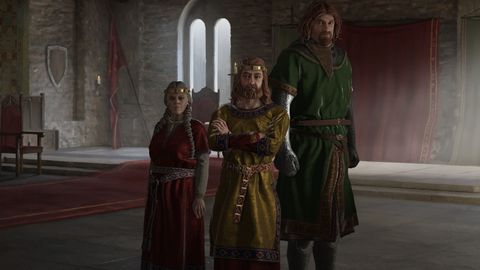Our Verdict
The king is dead, long live the king!
PC Gamer's got your back
What is it? A grand strategy RPG driven by messy nobles and constant drama.
Expect to pay £42/$50
Developer Paradox Development Studio
Publisher Paradox Interactive
Reviewed on GTX 1080Ti, Intel i7-8086K, 16GB RAM
Multiplayer Yes
Out September 1
Link Official site
I've become completely tangled up in Crusader Kings 3's plots and family trees. It's my jailer, keeping me far too busy orchestrating murders and becoming pen pals with the King of France to leave the flat. I should probably do something about that, but I've got this succession crisis to sort out. You know how it is.
There never feels like a good time to step away from Paradox's grand strategy RPG. You can't just go for a nice walk when your ruler is on death's door or the Byzantine Empire has just declared a holy war—there's always someone somewhere setting a fire that you're going to have to deal with. It's One More Crisis Syndrome and I've got it bad.
Anyone who's played Crusader Kings 2 should be familiar with the ailment and be well-prepared for the sequel. You are once again the head of an early medieval dynasty, and you'll try to keep it trucking for as long as you can by click, click, clicking on its elaborate map and stacks of menus. Your tools are diplomacy, intrigue, warfare and luck, and your goals are whatever whims your mind conjures up.

Like all grand strategy games, it's cursed to look incredibly imposing, but this is the friendliest of the bunch. It's shed none of its complexity, but it's much better at showing how everything is connected. On top of a serviceable tutorial that gets you started in Ireland, there's a tutorial menu that's accessible at any time, as well as a seemingly infinite supply of tooltips. Even the tooltips have tooltips. Getting advice is like stepping through a portal into a dimension constructed purely out of tips on how to lead a medieval dynasty, which turns out to be quite helpful.
Don't get too hung up on that stuff, though. You can obsess over numbers and powergame your way through history, or you can go on an experimental journey to create a matriarchal society in North Africa founded by Vikings, but you don't need epic ambitions to get the most out of Crusader Kings 3; all you need is a dysfunctional family.
Imagine The Sims, but you've got 20 people in your house, half of them have virulent STDs, and the others are plotting a coup. It's a glorious mess. Your dynasty doesn't exist in a vacuum, either, and will constantly collide with other families and courts, but you can burn through plenty of hours just mucking around with your domestic affairs and securing your grip over your realm.
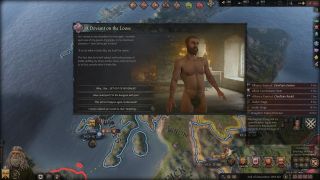
Crusader Kings has always been about characters instead of nations, but they've never seemed so rich and so maddeningly real before. Each of them is full of agency and ambitions and will more often than not devolve into a petulant child when they don't get their way. Adopting them is a big responsibility. They might be greedy, cruel, pious, horny, perpetually drunk—if you're looking for an adjective, you'll find it. Everything has a root cause, something that the trait can be traced back to, like a childhood bully or a battle that went badly, creating characters moulded by their pasts.
They start developing before they're even born. Parents can pass on congenital traits to their children that can be strengthened over generations, letting you promote things like intelligence and symmetrical features through arranged marriages and bad science. Inbreeding is one way this can be done—a perfectly normal thing to write in a videogame review—but that's a ticking time bomb. One of my rival dynasties ended up almost destroying itself by keeping it all in the family, which made a whole generation almost entirely infertile. Big Game of Thrones fans.
Crusader Kings 3 doesn't really need us at all.
A long-lived character can earn a confounding number of traits over their life, some of them slightly contradictory, but there are always a couple of reliable core personality quirks that bubble to the surface. Everyone gets an epithet that sums them up, so you don't have to trawl their character sheet to get the measure of them. I'd be Fraser the tired critic. These come in extremely handy when you're setting up marriages or considering someone for a job on your council. You don't want your marshal to be a irrational craven—unless you think it might be a laugh—and a marriage with a resentful villain probably wouldn't be a very happy one.

These details often end up reflected in a character's appearance. Everyone gets a 3D model, subtly animated and posed to reflect both their mood and personality. I saw a lot of scowling, but I just have that effect on people. Over the years you'll watch them change as they pick up wounds, diseases and simply age. You can get a glimpse into their lives just by looking at them. Meeting all these lively people is incredibly refreshing after spending years with Crusader Kings 2, where I had to interact with pictures taken during an open casket wake.
Sometimes they seem almost bespoke. All their stories are random, emergent narratives, but then you get these arcs that just seem too perfect. There are characters who go on these journeys taking them from nobodies to kings, full of surprise twists, heroic comebacks, secret romances—the lot of it. Crusader Kings 3 doesn't really need us at all.
To really make a mark on the world, as well as keeping your unruly dynasty in check, you first need to focus on beefing up your ruler and meeting some personal milestones. Thankfully, there's always one event or another hurtling towards you with opportunities for growth. You might walk into your bedroom one night and find a member of your court molesting one of your shoes or chamber pots, at which point you can chase them out or call the guards, but you might instead decide that, actually, fondling random objects is very much your kind of thing. And voila, you've got a new hobby. More wholesome events include having a really nice conversation with a new friend and getting a really cool dog.

By now, Paradox has become a master of pithy event text—it grabs you quickly, and then just as quickly it lets you move onto your next scandal. You can tell the writers had the most fun with the salacious stuff, but even mundane correspondence with bishops can be worth a read. With characters being more tangible, skimming their letters just seems rude.
Lifestyles let you chisel away at your rulers without having to rely on random events. They're effectively classes, each representing one of the game's skills. Through their education, everyone has an inclination for a specific lifestyle, but you can pick whichever one you want and reset all your progression if you change your mind. Each lifestyle is split up into areas you can focus on, giving you a persistent passive bonus and letting you start to earn XP that can be used to unlock perks from the lifestyle's three trees. Where its predecessor took a lot of inspiration from RPGs, this is a full RPG progression system that's fuelled by stories rather than kills and quests.
The intrigue lifestyle is what I've found myself gravitating towards the most. It gives you a leg up in the murky world of secrets, schemes and hooks, as well as spawning events that let you explore your shady side. I often start with good intentions, but it never takes long before I'm spinning my web. Or at least trying to. On more than one occasion, I've realised too late that I was really the fly.
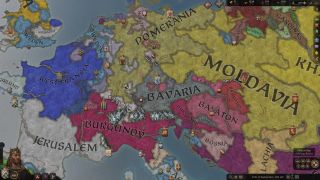
The lovely Mediterranean powerhouse I'd spent a lifetime building ended up ruined when my big mouth of a brother outed me for killing our other, stupider brother. I did the deed, I'll admit it. I sent my spymaster to dig around for secrets I could use as hooks to make people do my bidding. I seduced my brother's vassal and bribed one of his knights to join me in the plot. And when he was dead, I used the secrets I'd gathered to force my cowed nobles into making shitty deals and giving me more cash. So when my surviving brother found out about the deed, he tried to blackmail me and, failing that, he told everyone. All my vassals with their bruised egos rode up against me, naturally. I met a nasty end. That's what I get for dragging my 70-year-old ass into battle.
My fixation with intrigue ended up killing me, but it was also responsible for a lifetime that's stuck in my head. Lifestyles help turn the cavalcade of pop-ups and events into a cohesive story, setting the tone and making sure the drama you become embroiled in gives you the chance to develop the skills you're interested in, or at least builds on your past. And yeah, sometimes it will lead to your death.
The most insidious threat to a ruler, however, is stress. It's what keeps you honest. Or cruel. Or greedy. You gain stress whenever you act against your personality. If you're chaste and you start rolling around in the hay with a courtier, you're going to be wracked with guilt. It's sneaky. It got me once just because I thought about my deceased best friend. Boom—I'm feeling stressed. I hit the bottle to push down those feelings, and then I kept hitting the bottle until I looked like gammon. And then I died, again.

Sometimes I'd talk myself into taking the stress penalty—it's just poisoning one guy, it's fine, just do it—but it quickly ramps up. There are so many ways that it can kill you or just make you utterly useless, so the prospect of getting stressed in a game made me extremely stressed in real life. It's awesome. There's more weight to these choices, more risk, and the price of free will is the constant threat of an existential crisis.
I've always had a problem with RPGs letting you make completely out-of-character choices without any real consequences. You can play Commander Shepard as a paragon of virtue and then turn around and be like, "I'm super racist now, guys", and nobody thinks that's weird. It's fine. Here's some red karma. Crusader Kings 3 will kill your ass if you try that shit.
While you can spend incalculable hours wrapped up in roleplaying and intrigue, there's a huge simulated world to paint in your colour. It's a sprawling, kaleidoscopic map that stretches from Iceland to Nigeria to Tibet. What were often tiny bits of land with few identifying features in Crusader Kings 2 are now large regions with their own character.

Diverse terrain, unique geographical quirks and special buildings set these areas apart and make some of them very tempting prizes for would-be conquerors. These are also considerations that you'll need to take into account if you're the conqueror. Maybe the fortress you're besieging has monumentally tough walls, or the terrain might put your cavalry-heavy army at a disadvantage. The expanded map also means expanded tactical wrinkles—welcome ones—that make fights less of a pure numbers game.
Crusader Kings 3 will kill your ass if you try that shit.
OK, a lot of the time it does just come down to who has the most people willing to charge into battle. And you'll usually need to chase them and fight them again until they're completely wiped out. It's still Crusader Kings. There are more opportunities to get an edge, though, like using knights and more high quality, specialised troops. Knights are like regular members of your court who want titles and legacies and a litany of other things, but they're also brilliant warriors who will wade into battle alongside the army's commander and slice their way through the peasant levies. They're badasses, but as they grow more influential they'll have greater expectations, and your greatest knight could also become your greatest rival. It's all very Arthur and Lancelot.
There are other ways to conquer the world that don't come with the responsibility of managing an empire that spans continents. You can expand your dynasty to every corner of the map without gobbling up every county, using marriage and inheritances to place your relatives in seats of power outside your own realm. Powerful members of your dynasty might also decide to form a cadet branch, getting out from under your influence and gaining control over the family members in this new house.
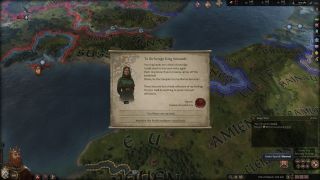
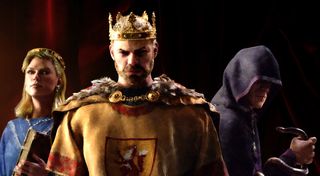
CK3 guide: Beginner tips to get you started
CK3 console commands: All the cheats you need
CK3 Intrigue: Become a master of the dark arts
CK3 religion: Control your population through faith
CK3 war: Vanquish your enemies
CK3 mods: From tweaks to total conversions
You're not sacrificing power; you're dividing responsibility. Other houses and independent rulers contribute renown to the dynasty, and as the head that means you're able to throw your weight around and spend that renown on dynasty-wide legacies—think perks, but they're permanent and for the whole family. Eventually you can build a dynasty of warlords or ensure that all the realms under your dynasty's umbrella run with machine-like efficiency. These are long-term goals, but you can get your first legacy fairly early on, laying the foundation for your specialised dynasty.
It has been a huge relief to let some other characters do some of the heavy lifting. Leading a dynasty to immortality is exhausting, but now it's a team effort. Some branches will wither and die, while others might embed themselves within a foreign empire and then one day rule it, but I'm happy as long as I'm getting that sweet renown. Spreading your dynasty lets you enjoy the hit of power and rush of expansion but doesn't ditch you with a whole host of new administrative problems. All of the glory, but not quite as much of the hard work—it's the dream.
The loftiest ambition, of course, is to make everyone agree your god is the best one, or you could get in on the medieval era's biggest craze: heresy! Yes, if you're bored of Catholicism or another established religion, you can just make your own faith. This can cause a lot of instability, piss off the dominant faith and requires a lifetime devoted to piety to pull off, but it's entirely worth it.

Religion in Crusader Kings 3 is vastly influential and usually chock full of rules that ruin everyone's fun. They're strict and way too interested in what people do in their own bedrooms, or sometimes the beach, and once behind the stables. Your new faith can get rid of all that. Faiths are built out of tenets, traditions that come with special mechanics—normal stuff like communion, human sacrifice and ritual cannibalism—and doctrines that determine the legality of things like same-sex relationships, who can become a priest and if divorce is OK. There are 14 doctrines that you have to settle, a trio of tenets to pick (from a list of around 50), and then you've got to decide what traits are virtuous or sinful. You might as well make yourself head of the faith while you're at it, but if you'd rather work behind the scenes you can let others enjoy the glory.
Creating a new culture works in much the same way, but there's also a discrete culture system that's tied to innovations. New laws, unique units and special bonuses can be unlocked over time for everyone in the culture, but only the dominant ruler can actually pick what innovations to focus on. Even research becomes another source of competition and intrigue as you try to keep your fellow rulers behind you. Just as new faiths keep popping up, new cultures can also appear and start challenging their more established neighbours.
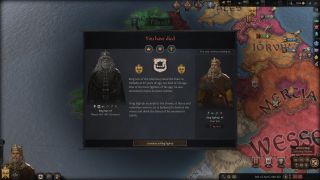
Crusader Kings 3 is always in motion, always jumping to new stories, so it never lets you get too settled. But it also never ventures far out of its comfort zone. Paradox hasn't taken it in a different direction or made changes that will elicit any gasps. The stuff that made Crusader Kings 2 so enduring has been pushed to the front even more, while some of the bloat that accumulated over the better part of a decade has been chipped away. It's a very sensible sequel.
I know, I know—'sensible' is not the most encouraging of words. Let me reassure you, then, that Crusader Kings 3 is incredible. It's an irrepressible story engine that spits out a constant stream of compelling alt-histories, delightfully infuriating characters and social puzzles that I've become obsessed with unravelling. I can't imagine being done with it. I just subsist on digital drama now. Will Alfred finally leave the torture chamber and make a friend? What's Bjorn going to do now that he knows his wife is in love with his chancellor? And who's going to be committing patricide next? I need to spend less time writing reviews and more time with my dynasties.
The king is dead, long live the king!

Fraser is the UK online editor and has actually met The Internet in person. With over a decade of experience, he's been around the block a few times, serving as a freelancer, news editor and prolific reviewer. Strategy games have been a 30-year-long obsession, from tiny RTSs to sprawling political sims, and he never turns down the chance to rave about Total War or Crusader Kings. He's also been known to set up shop in the latest MMO and likes to wind down with an endlessly deep, systemic RPG. These days, when he's not editing, he can usually be found writing features that are 1,000 words too long or talking about his dog.
